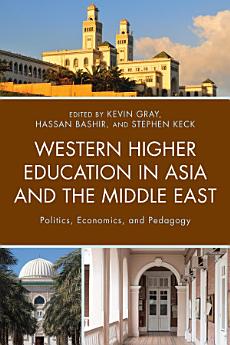Western Higher Education in Asia and the Middle East: Politics, Economics, and Pedagogy
Hassan Bashir · Stephen Keck · Kevin Gray
Dec 2016 · Bloomsbury Publishing PLC
Ebook
296
Pages
reportRatings and reviews aren’t verified Learn More
About this ebook
This multidisciplinary volume highlights the transformed nature of the relationship between higher education and society in the 21st century. In particular, it argues that the development of the global university, especially in the non-western world, has transformed the traditional understanding of the relationship between higher education and society. This has important implications for the relations of state, as education has not only become an object of national development policy but for many states an important export.
The history of the university reflects the decisive social transformations which have given definition and identity to both new nations and modern societies. In the post-war period, universities in the industrialized world underwent a radical shift. The mass expansion of higher education ensured that universities were no longer centers designed to train youth to assume the leadership positions held by previous generations. Instead universities were to become centers where job skills could be imparted and knowledge produced, refined and used in the newly emerging Cold War economies, and where students could develop the skills necessary for employment in a changing world. Rather than focusing on the refinement of future leaders, the task of the university became linked to the development of economically exploitable technical knowledge.
A shift of comparable magnitude is now ongoing in the nature of higher education itself. Globalization has led to the growth of knowledge communities around the world, mirroring the rise of centers for global finance in previous decades. In the Middle East and Asia the demands of the knowledge-based economy have led to the opening of new indigenous universities and branch campuses and partnerships with established European and North American universities. Education City in Qatar, for instance, has received or been pledged more than 200 billion dollars since its inception.
The growth of new indigenous universities has altered the traditional role of the university further, increasing the emphasis on courses which are close to the marketplace. These new partnerships have contributed to the creation of what is now referred to as the global university.
The history of the university reflects the decisive social transformations which have given definition and identity to both new nations and modern societies. In the post-war period, universities in the industrialized world underwent a radical shift. The mass expansion of higher education ensured that universities were no longer centers designed to train youth to assume the leadership positions held by previous generations. Instead universities were to become centers where job skills could be imparted and knowledge produced, refined and used in the newly emerging Cold War economies, and where students could develop the skills necessary for employment in a changing world. Rather than focusing on the refinement of future leaders, the task of the university became linked to the development of economically exploitable technical knowledge.
A shift of comparable magnitude is now ongoing in the nature of higher education itself. Globalization has led to the growth of knowledge communities around the world, mirroring the rise of centers for global finance in previous decades. In the Middle East and Asia the demands of the knowledge-based economy have led to the opening of new indigenous universities and branch campuses and partnerships with established European and North American universities. Education City in Qatar, for instance, has received or been pledged more than 200 billion dollars since its inception.
The growth of new indigenous universities has altered the traditional role of the university further, increasing the emphasis on courses which are close to the marketplace. These new partnerships have contributed to the creation of what is now referred to as the global university.
About the author
Kevin Gray is assistant professor of philosophy in the Department of International Studies at the American University of Sharjah.
Hassan Bashir is associate professor of political science at Texas A&M University at Qatar.
Stephen Keck is academic director and professor of history at Emirates Diplomatic Academy.
Hassan Bashir is associate professor of political science at Texas A&M University at Qatar.
Stephen Keck is academic director and professor of history at Emirates Diplomatic Academy.
Rate this ebook
Tell us what you think.
Reading information
Smartphones and tablets
Install the Google Play Books app for Android and iPad/iPhone. It syncs automatically with your account and allows you to read online or offline wherever you are.
Laptops and computers
You can listen to audiobooks purchased on Google Play using your computer's web browser.
eReaders and other devices
To read on e-ink devices like Kobo eReaders, you'll need to download a file and transfer it to your device. Follow the detailed Help Center instructions to transfer the files to supported eReaders.








